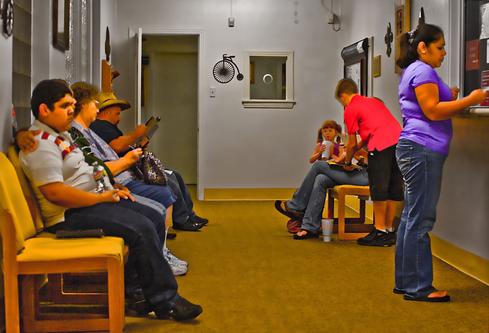Wearable Health Tech: Many Promises, Few FactsWearable Health Tech: Many Promises, Few Facts
Digital fitness devices are the rage -- among healthy people. The healthcare community won't know the value to sedentary patients until unbiased research arrives.


10 Waiting Room Apps That Engage Patients
10 Waiting Room Apps That Engage Patients (Click image for larger view and slideshow.)
Personal health devices such as Fitbits hold promise, but healthcare providers need unbiased answers about health benefits and financial responsibility before they can consider prescribing them to more patients.
The overall digital fitness device retail market was worth about $330 million in 2013, according to NPD Group. This does not include purchases directly from a vendor's website. Fitbit represented 68% of the market; Jawbone UP held 19% marketshare, and Nike FuelBand earned 10%, while all other vendors carved up the remaining 3% of sales, NPD Group reported.
Most of today's users are early adopters, and are not necessarily the patients who would benefit most from these devices, said Dr. Daniel Sands, a primary care physician, co-chairman and co-founder of the Society for Participatory Medicine, and an assistant clinical professor of medicine at Harvard Medical School. Today's Fitbit, UP, and FuelBand users already are invested in their health, exercise regularly, and eat well, he said. By comparison, patients who live sedentary lifestyles and make unhealthy choices are unlikely to buy a digital fitness device today, Dr. Sands said in a presentation at the HIMSS healthcare IT conference.
Wearable fitness devices suffer from overinflated expectations and hype, said Jane Sarasohn-Kahn, a health economist and advisor. Device users want healthcare providers to analyze and use their data to help the patients improve their health. Non-users need more reasons to adopt.
[How practical are wearable fitness devices? Read Are Wearables More Fragile Than Fun?]
Because current users already are typically fitter and living healthier lifestyles than the average American, healthcare providers need studies with control groups to determine whether the products actually encourage wearers to move more and live healthier lives, said Dr. Sands. Today's personal fitness devices could be digital versions of corporate wellness programs, where businesses encourage employees to quit smoking, exercise more, or reduce stress, he said. A recent study by RAND researchers and PepsiCo determined lifestyle-management programs had no significant effect on healthcare costs.
"Every major employer offers these programs … but they don't really have an impact on improving health or reducing costs," Dr. Sands said. "Does [Fitbit] make sense or is this another case of wellness programs? Is this something that's valuable? By the way, I'm a believer. I think this is very interesting and potentially very exciting."
Over the past six months, Dr. Sands has prescribed the devices for some patients.
"I've been trying to find out if they take my advice, buy this, and if it motivates them," he said. "To whom should I prescribe this technology and is somebody going to pay for it if I prescribe it? Will I get reimbursed for the time I spend reviewing information I get from patients? How many different systems do I need to track? Is it going to help my most difficult patients?"
Doctors worry about data overload, too, he cautioned. "More data isn't always a good thing. It's not always good to do every test. It's not always good to do a total MRI scan. There's a lot of bad that can come out of this stuff. There are a lot of things that can lead to unnecessary procedures and anxiety," said Dr. Sands.
Some doctors will independently recommend these devices to patients. If there's evidence they help patients' health improve and insurers reimburse doctors for their work analyzing the data they produce, physicians will no doubt prescribe more fitness devices to sedentary patients, he said.
Medical data breaches seem to show up on the 6 o'clock news almost every week. If you think it wouldn't happen to you -- or the financial impact will be minor -- think again. Download the Healthcare Data Breaches Cost More Than You Think report today. (Free registration required.)
About the Author
You May Also Like






